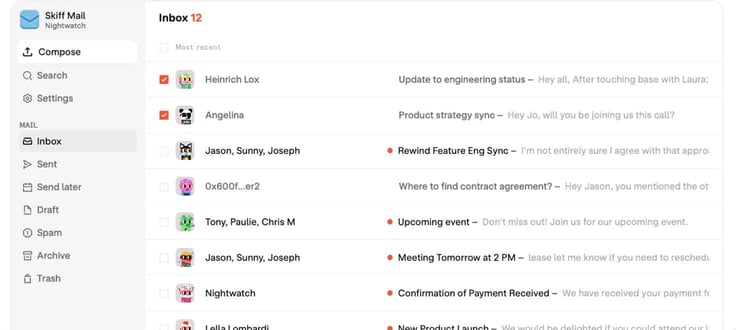
TL; DR: Skiff offers a robust and private workspace system with email, calendar, collaboration, and cloud storage. Its end-to-end encrypted software leverages the processing power of end-user devices to decrypt messages and other data for use and communication. The Skiff platform is private-by-design and prioritizes usability for a smooth user experience. Skiff’s infrastructure doesn’t allow the company to spy on customer data and protects users from hacking attempts. Skiff plans on relaunching its mobile application soon to boost performance and enable offline use.
Free products are great at first glance. They seem like a steal, getting value without spending a dime. But underneath the glamour of a complimentary service is an apparent, or sometimes hidden, tradeoff. Tech companies, including Meta and Twitter, offer various applications and services free of charge, but this is usually at the user’s expense. The user becomes the product, and their privacy the tradeoff.
Fortunately, more people are becoming educated on user privacy rights and how companies sell information and profit from targeted advertising. As users become aware of the current state of digital privacy, many are turning to services with privacy-first infrastructure to carry out their communication and other digital operations. But sometimes, to protect privacy, users must accommodate a confusing or rigid interface to enjoy those benefits.
Skiff tackles this issue by offering customers a robust, privacy-first workspace with a smooth user experience and without the usability tradeoffs.

“People believe there’s this tradeoff of usability and privacy that we believe is entirely false. We want to build usable and private products. Privacy here means end-to-end encryption, where as a service provider we can’t see your underlying data,” said Nishil Shah, Director of Security at Skiff.
Skiff offers an all-in-one workspace for communication and productivity, with tools for email, document filing, scheduling, and collaboration. Its platform is similar to Google Workspace and Microsoft 365 but completely private with end-to-end encryption. Users who want to keep their data safe and protected from prying eyes can leverage Skiff to remain productive without the risks or complicated privacy steps.
Balancing Privacy and Usability with User-Friendly Design
Three years ago, Skiff’s founders launched the company with the idea of building the next-generation workspace for the internet. Skiff provides four solutions for workspace collaboration: Mail, Pages, Drive, and Calendar. These tools balance privacy and usability to deliver a smooth user experience, and that balance lies in Skiff’s user-friendly interface.
“We have a huge emphasis on design. Users shouldn’t be required to have a background of an engineer or have a Ph.D. in cryptography to use these tools. We want to build privacy products that just work.” said Nishil.

Skiff builds privacy right into its infrastructure, so users don’t have to jump through any hoops to ensure their privacy protection. Its user experience is similar to those of any other big-name collaboration companies. Because of that usability, teams can get started with its tool easily and quickly. How Skiff’s encryption works is pretty seamless and straightforward.
It all starts with the application design. Skiff’s end-to-end encryption leverages the processing power of mobile devices and local memory to send encrypted messages and notifications. Once the app receives this message, it can decrypt it, and the message will pop up as unencrypted without the user knowing any of it.
“It’s a few extra steps we have to do for our users so that they can get the unencrypted message. But the end result is that the user feels no different, and they’re getting all the features they would have expected from any sort of workspace suite,” said Nishil.
Delivering a Personal User Experience with End-to-End Encryption
Skiff distinguishes itself from other workspace competitors by allowing users to have a personal digital space protected from even Skiff’s own monitoring. Free workspace providers have the ability to spy on their users’ data and breach the confidentiality of their data. Skiff developed its platform in a way where no one from its team will ever have access to customers’ personal data.
“It’s the cryptography underneath. All this data is encrypted by your device, iPhone, or laptop. So we will never be able to tell what is happening with your data, and there’s no way to change that. We have no way to walk back that promise in the future,” said Nishil.
With that assurance, users can have peace of mind regarding data privacy with Skiff. But much can be said otherwise for other software companies, according to Nishil. Many tech providers scan emails and user content for various reasons. Since internal employees also have access, it can be challenging for companies to track what employees are doing with user information even if they promise data security because they don’t have that privacy-first infrastructure in place.
“These companies have done a good job of marketing to us about the sense of security they can provide, but they don’t protect you necessarily from themselves. At Skiff, we understand that people need a sense of privacy,” said Nishil.
Skiff’s end-to-end encryption also protects customers from the ramifications of hacking attempts and other breaches. Some companies that get attacked end up exposing customer information to data leaks. And Skiff doesn’t run ads nor can it sell user data to third-party sources.
“We’re running off of a subscription model at the end of the day. So we don’t have any reason to sell this data in the first place to any data brokerage or ad platform. At a mission level, we’re not going to do that, but even at an economic level, it doesn’t make sense for us,” said Nishil.
Enhancing Productivity and Performance with New Features
Skiff serves privacy-conscious users and customers who need privacy tools for more extreme, existential use cases. The company takes privacy protection seriously with a robust system because of its mission and for these reasons. The Skiff team created its products to give users a safe digital space to be productive, and it continues to innovate to help customers be more efficient.
“We have a ton of feature requests users are asking us to build, and we’re going as fast as possible. We’re a small team. So we’re heavily working on inbox organization to set up filter rules and filters on the text or the body of the content itself,” said Nishil.
Skiff will allow users to filter body content by enabling their devices to do the filtering work in the background and then perform the corresponding action. Customers can also buy custom domains through Skiff and use them for their email addresses. Skiff will take care of setting up all the DNS records including SPF, DKIM, and DMARC.
As for other projects coming soon, Skiff plans on relaunching its mobile app to improve performance and deliver offline access. The Skiff team has already started using the new and improved app internally. The team has added many new features requested by users and has boosted its security measures. Customers currently have the ability to use 2FA authenticator apps to protect their accounts and will soon offer hardware key support as a stronger level of protection.
“We’re always working on better pricing plans for our customers and have launched Skiff Essentials along with offering an in-app credits system and Skiff for Startups credits,” said Nishil.
Skiff Essentials starts at $3 per month and can be viewed here.


